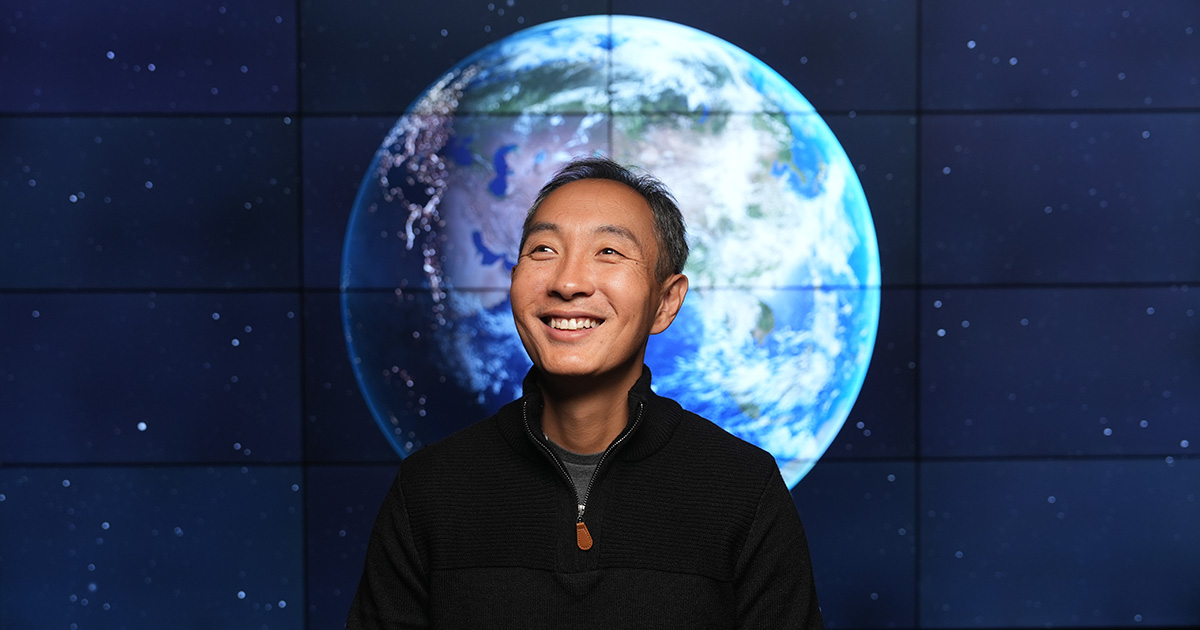Professor named 2025 University Faculty Scholar for research in quantitative forest ecology
When Jingjing Liang, an associate professor in the Department of Forestry and Natural Resources, was named a 2025 University Faculty Scholar, the recognition celebrated not only his academic excellence but also his vision for the future of forest science—one that is contributing to reshaping how the world understands and manages forests amid accelerating climate change, biodiversity loss, and the rise of artificial intelligence-driven discovery.
My research involves building models to better understand data with regard to forest ecosystems. This data has multiple sources—ground sourced forest inventory data and remote sensing data layers as well. The goal is to detect data trends to understand some of the most fundamental ecological questions. For example, how many tree species are present, where they are located and why they are distributed across the world in a particular way.” -Jingjing Liang
Liang leverages artificial intelligence, machine learning and big data analytics to address critical ecological questions. He is the founder and chief science officer of Science-i, a transparent and FAIR (Findable, Accessible, Interoperable, and Reusable) web platform, with a strong focus on inclusivity and knowledge-sharing, particularly in underserved regions. This work is proven by his recent collaboration with the Food and Agriculture Organization (FAO). Currently, Liang is on sabbatical leave with FAO in Rome Italy, where he is focused on pushing the boundaries of artificial intelligence and data science to make discoveries that have yet to be imagined.
“Throughout my career, I found that artificial intelligence-based models are very versatile and are becoming more useful to analyze data,” said Liang. “One important part of my research is focused on advancing the field of artificial intelligence, and especially its applications in forestry.”
Liang’s academic journey began at Peking University, where he studied China’s response to desertification. He later earned his Ph.D. in forestry from the University of Wisconsin-Madison, where he focused on the effects of biodiversity in forest growth, and how to use this information to better manage and conserve forest resources. After finishing his Ph.D., he worked for the U.S. Forest Service in Missoula, Montana, before transitioning into academia.
Before coming to Purdue, Liang also held positions at the University of Wisconsin-Madison, the University of Alaska Fairbanks and West Virginia University. At the University of Alaska Fairbanks, he helped digitize the state’s first comprehensive forest inventory database.
“For over 10 years, all the data was on paper sheets and stored in someone’s drawer,” highlighted Liang. “Based on this work, we were able to work with colleagues from around the world and compile a global forest inventory database of now over 1.3 million sample plots.”
Since joining Purdue in 2018, Liang has led the Purdue Forest Advanced Computing and Artificial Intelligence (FACAI) Laboratory, serves on the steering committee for Purdue Institute of Physical Artificial Intelligence (IPAI) and is also a faculty affiliate of the Purdue Institute for a Sustainable Future (ISF).
I finally found home at Purdue, and have had many great collaborations with my colleagues. With the magnificent support from the College of Agriculture, especially my department, we were able to grow the consortium and the database significantly.” -Jingjing Liang
Outside of the classroom, Liang has published over 90 peer-reviewed articles. His studies have redefined ecological paradigms and global policy discussions, such as his Science publication revealing that species-rich forests are substantially more productive and his PNAS study estimating that approximately 14% of the world’s tree species have yet to be discovered. These contributions have captured public attention, with coverage on CNN and the BBC, and in Scientific American, Forbes and The Washington Post.
Reflecting on being selected a 2025 University Faculty Scholar, Liang said, “One of the proudest moments of my career has been establishing the Global Forest Biodiversity Initiative (GFBI), a consortium of forestry practitioners, professors and scientists from over 125 countries. Simply bringing the world together to address some of the most urgent forestry and ecological questions has been a standout moment.”
Liang emphasizes that his achievements are the result of collaboration, crediting the 300 to 500 researchers he’s worked with worldwide. “Every one of them are indispensable and critical to the research I do. I also want to recognize my Ph.D. advisor, Dr. Joseph Bongiorno. He helped shape my early career, and I aspire to make a difference in forestry like he did.”
Looking ahead, Liang is committed to supporting the next generation of researchers.
I’ve had the privilege of meeting so many young researchers. They have brilliant ideas and are very dedicated. I want to help get them to the proper stage of their careers.” -Jingjing Liang







